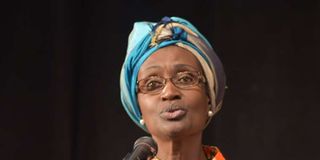Winnie Byanyima recounts encounters with sex pests

Winnie Byanyima, UNAids Director on HIV Control and the Covid-19 Pandemic.
What you need to know:
- Ms Byanyima says that on two occasions, men attempted to assault her, including a lecturer and a family friend.
- She opened up on the circumstances under which her parents moved her from Makerere University to the University of Manchester, England.
Winnie Byanyima, the executive director of Joint United Nations Programme on HIV/Aids, says she was sexually harassed in 1977 when she was a young student at Makerere University.
She was in school during the brutal regime of Idi Amin, who was Ugandan president from 1971 to 1979 when he was overthrown. He ruled Ugandans with an iron fist.
Ms Byanyima says that on two occasions, men attempted to assault her, including a lecturer and a family friend.
In an interview on BBC's Desert Island Discs programme, she opened up on the circumstances under which her parents moved her from the Kampala-based university to the University of Manchester, England.
She later graduated with a degree in aeronautical engineering, becoming the first female Ugandan to break the glass ceiling in the profession.
“What happened is a story I have never really told, but it was very defining for me,” she began her narration.
“A junior lecturer walked into my room one evening and made a proposition that I should be his girlfriend and that way I would be sure to pass my exams.”
Rejected overtures
But she said she was “quite a confident little girl,” and asked him to leave.
“I said ‘I don’t need any help to pass my exams.’”
The angered lecturer left but not without a warning to her that she was going to regret rejecting him.
“So, I rushed to my parents and told them what had happened. My parents said, ‘Well, get out of there, you can’t spend the next four years being blackmailed like that. It is unacceptable,’” she said.
Then a family friend “friendly with the generals promised to get her permission” to leave the country and find a scholarship to study elsewhere. Her preference though was to study in the United Kingdom.
“So, this friend came to take me to meet an official in the Ministry of Education. He didn’t take me to the ministry. He first took me to his apartment. He said he’d forgotten something,” she shared.
“We got to his apartment, he put on music on his player…, and he came to grab me. I screamed. He was embarrassed.
“He stopped, put me in his car (and) dropped me back at the university, and said ‘I was stupid, I was childish. These things happen. He called it things.”
Ashamed to admit
She said she was 18 then and had never had a relationship with a boy.
“This was an attempted rape. I was frightened. At that time, there was not even a word called sexual harassment or abuse. There was rape, but you felt ashamed to admit it,” she said.
And so when she finally got to England, she gave other reasons as to why she left Uganda.
“When I arrived here in England at the Immigration, I said I was running away from Amin. I was asked why. I mentioned my cousin who had been killed. I said, I feared for my life,” she said.
“But I couldn’t say there was an attempt to rape me, to abuse me sexually several times. It was too shameful.”





